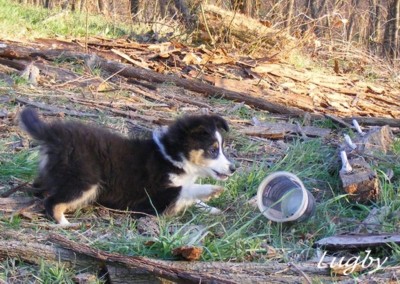
| Home | |
| Activities | |
| Your pictures | |
| Your hearth-warming | |
| Rescue | |
| Our breeders | |
| Links |
 |
The beginning of an adventure ... for him and for you (Part II)
 |
Hygene :
A puppy is not naturally house trained, in any case not at the age of eight to ten weeks. He will need to be taught, just as his mother taught him not to soil the « nest ».
Always use a method where praise is more important than scolding. It is more efficient and more pleasant for both you and the dog.
If he « forgets himself » and you catch him in the act, say « no » firmly and put him outside so that he can finish. Then praise him.
If he relieves himself spontaneously outside, praise him strongly.
If you find a mess too late, don't scold him (he won't make the connexion as dogs live mainly « in the present »), take him out of the room before cleaning up.
A puppy often relieves himself after a nap or after a meal. If you take him out systematically at those times and praise him when he relieves himself outside, he will soon learn to be house-trained. Of course, a whole night is too long to control the urge, but that will soon improve. Above all don't lose patience.
The puppy and children :
Dogs, and young puppies in particular, have very good « memories ». A trauma when young will remain for life and may result in undesirable behaviour. Besides it is the same in children.
Therefore it is recommended to be extremely vigilant when children come into contact with a dog. A sudden clumsy movement, ear or tail pulling, shouting near him, will scare him...this may later cause nervousness, or even fear, when near children...and fear is always the first cause of biting. If your children are old enough to understand, and however patient the dog seems to be, they must be told that this cute furry creature is neither a cuddly toy, nor a plaything. He must not be beaten, woken when sleeping, or his dish be touched. Any dog, however patient he may be, remains a living creature. He has his limits, all the more reason to avoid testing them.
The bond :
I think this is the most important part of all, for it is essential. The bonds that you create little by little with your pet is the foundation of everything, whether it be his behaviour, his education or his well-being (and yours too of course).
There is no set recipe, as in any relationship, it gets stronger with the time you spend with your dog, with the many moments of complicity that you share, stroking him and playing...you can use those moments to encourage the type of behaviour that you wish him to adopt, naturally, without necessarily any hurry or « working » sessions to improve his education or training (even if its a good idea to do that also...)
One thing is sure: a dog will always return the love you give him multiplied by a hundred.
Christine COL
Translation by Helen COL